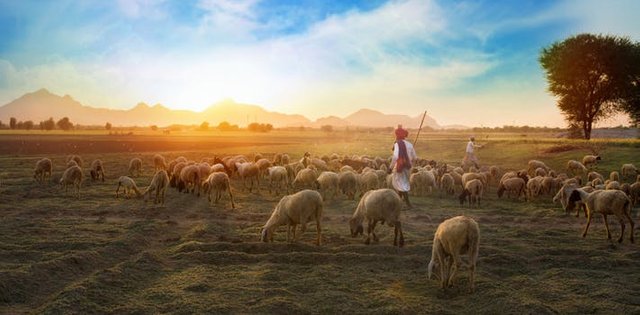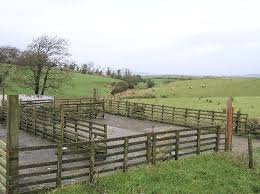HOW TO START SHEEP REARING BUSINESS IN NIGERIA
Animal production is a niche in the agricultural sector that is rapidly gaining popularity, as well as the interest of many young folks who are contemplating of starting an agro-business, because of its economic potential.
According to Food And Agriculture Organization (FAO, 2013), China is the largest importer of sheep meat, alongside with countries like USA, France, United Kingdom, Germany, Belgium, Hong Kong SAR, Malaysia, Netherlands, and Italy. While New Zealand with about 34% of world's sheepmeat export rank number one in the top 10 list of Goat and sheep meat exporters with over $2billions trade value.

In 2013, Statistics showed that Nigeria produces not more than 2% of the world's sheep production of about 8.7 million tonnes. Thus, many individuals, particularly young Nigerians want to seize the positive prospects inherent in sheep farming, but to a great extent, they lack clarity as to how to start. Well, this post is created to provide such a help.
However, before we dig in deep into the core of this write-up, it is needful we briefly look at...
Why Sheep?
Essentially, Sheep farming is a lucrative venture for anyone to dive into, because of its advantage. To start with, sheep reproduces and grows at a faster rate, which makes it advantageous over some other domestic animals. Also, sheep seem to possess a high resistance to diseases compared to some other animals. They are not only reared because of their meat, almost everything about sheep is money; you get milk and fibre (wool) from them. You can see anyone who decides to start up a sheep farming is really in for the real deal. (Truly, there's money in the farm.)
Now, let's get into...
Things To Practically Consider When Starting Out In Sheep Rearing Business
I would say, the primary thing you need to set out clear is your "Why" -- for wanting to rear sheep, because objectively doing this will help you in the selecting the particular breed you want to rear; depending on your need.
The following are the different breed of sheep you can find in Nigeria:
Balami
A large chunk of sheep reared in Nigeria are of this breed; they are usually tall and huge-- having a white colour, and slack ears. They are found in places such as Maiduguri.Uda
This breed normally has dual colour; a mixture of black and White, or brown and white. They are always of a large size when they grow up.Yankasa
This is the most commonly seen type; they apparently look like a cross bread of Uda and Balami, and usually have black patches on their legs, as well as around their eyes, or as the case may be.West African Dwarf
As the name implies, this breed basically has the lowest growth rate compared with the other breeds aforementioned... they are short and stubby. You are going to found this breed mostly in the Middle belt regions.
Okay, take a pause!
After you've chosen the particular breed you want to raise, depending on what you want and your location or state, the secondary but crucial factors below are what you will then need to consider carefully.
Source of Supply
There is no business without assets. And in sheep farming, your sheep constitute your major assets. The reason why you should be very meticulous as to where you intend to get your stocks (sheep) from.

In Nigeria, the Northern part still remains the king (so to say) of animal husbandry. So, they are usually the sheep merchants from which you can buy your sheeps from. On this note, you can decide to buy medium-sized rams and ewes, which may cost at the average of #20000-#25000 and #15000-#20000, respectively per one. (The rams are more expensive than the ewes). Having said this, the cost of transportation to your location is another thing to bargain, perhaps as part of your purchase price with the cattle dealers.
Breeding
All of the breeds of Sheep described above, grow into maturity in the space of 5-6 months. But you might want to continue rearing them up to a year, so as to allow them to gain huge body mass before you take them to the market. And this means more profit.
The ewe (the adult female) experience their heat period at an interval of 16-18 days, while their gesticulation period spans for about 148 days. And for the record, the male sheep (the rams) are cohabited with the *ewes for the sake of reproduction, at a ratio of 1:39.
Feeding
Sheep practically eat fresh grasses and forages, but how your sheep will feed is somewhat determined by the technique you choose to adopt in rearing them, which may be intensive or extensive; that is to say, you can allow them to graze around openly or in an enclosed area called a Sheep Pen.
If you want to house them in a sheep pen, the dimensions should be over 5 feet in height, at least 17 square feet area; built in a such a way that it is spacious and easy for you to access feeds for the sheep.

Note, open grazing is good, but building a pen for your sheep goes a long way in preventing them from contracting certain diseases.
The sheep feed they are relatively cheap—the cost is determined by a few factors such as proximity, amongst others. Also, adequate water is very necessary at least 3-5 litres per day. The water should be refilled from time to time.
Business Time… Selling time!
Selling your fully matured sheep can be fun and rewarding. The adult sheep can be sold at an average price of #40000-#80000 in suburban areas like Bauchi, Yola, and Bayelsia. But for Urban cities like Lagos the prices are on the high side.

It’s very true that sheep rearing business can a source of wealth creation for anyone, but it requires a great deal of your time and money. Therefore, commitment is the key to succeeding in sheep farming.
A sheep in its first year is called a lamb, and its meet is referred to as a lamb, too. But sheep that are older than a year are known as juvenile sheep, while their meat is termed hogget. And for the adult sheep, their meat is called mutton.
The author disclaims any liability in connection with the use of the information contained in this post. Information provided is strictly for assistance purpose.
THANKS FOR READING
LOVE YOU
@degreatmyke
Thanks to @farms for this opportunity.